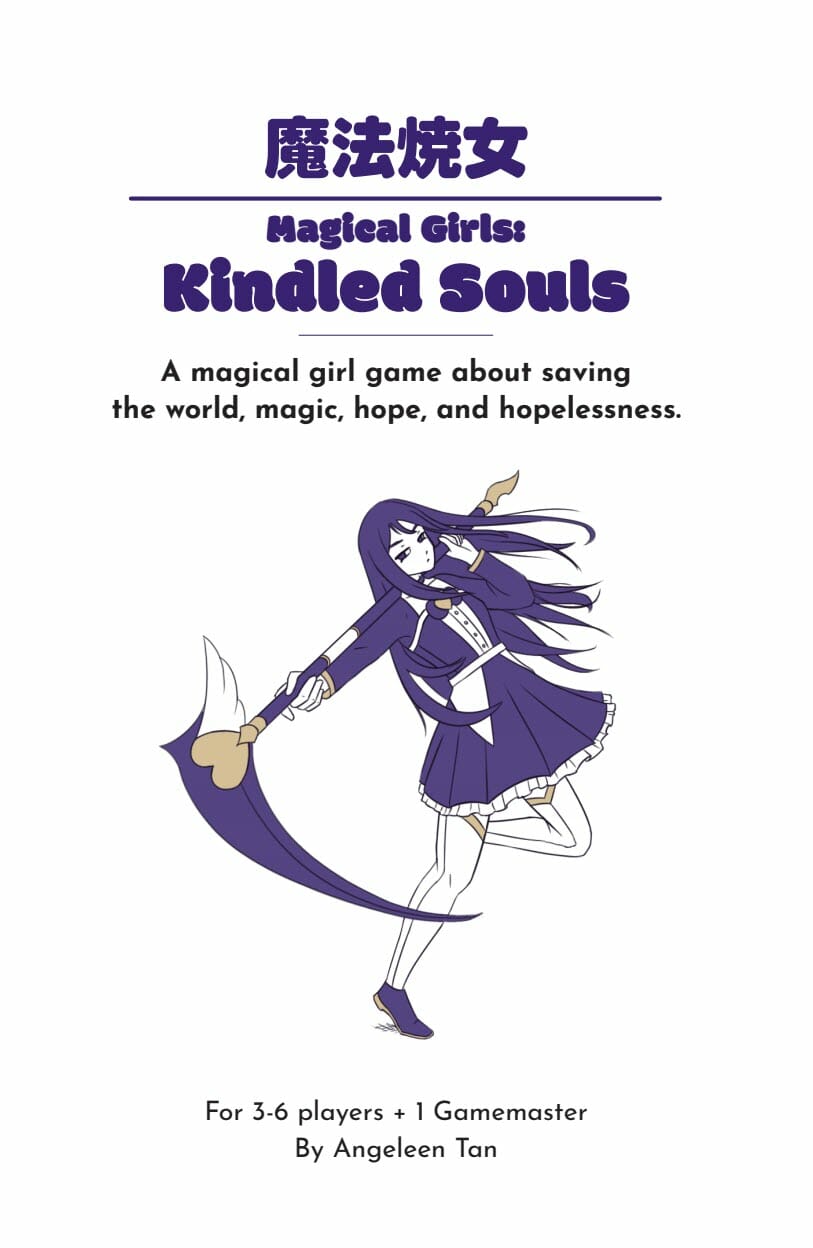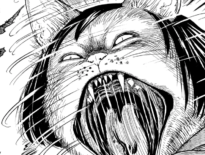“Magic Girl” in anime is a genre in which an everyday teen becomes a magical superhero. As a general rule, shows in this genre are about optimism, teamwork and friendship as the escapism of transforming from humdrum to dramatic leads to success in the face of adversity.
Angeleen Tan’s magic girl game Kindred Souls seems to follow suit. Here’s the front cover tagline;
A magical girl game about saving the world, magic, hope, and hopelessness.
See that last word creep in?
Kindred Souls is a 23-page Name Your Own Price at Itch. I paid the suggested $2, and although the game is light in art, I think it is excellent value. You can easily spend $2 for a one-page hack of Lasers & Feelings at Itch. Here we get an original system that’s safely in through the teens in terms of page count.
On page 18, Tan clarifies what this particular set of Magic Girls adventures will be like. The “Tips on Running the Game” section begins;
This game is meant to be brutal in difficulty; someone, or multiple people, might die. The players should always be outnumbered, outgunned, etc. Don’t be so mean to the players that they stop having fun, but add enough challenge that there’s always something going wrong. For the first encounter, try having double the number of characters of basic enemies, and take it from there.”
Youch! Not only is this brutal, but it takes some of the mechanics of Magic Girls from “nice to know you can do that” and to “absolutely have to do that as often as we can!”.
The Magic Girls system
You’ll have three main stats; Light, Morale and Magic. These are all resources you’ll have to manage incredibly well, especially Morale, as that gets eaten up as the tide turns against you.
You start with 25 out of 30 Light, 15 out of 20 Morale and 1 out of 5 Magic. Light is the source of your power and health, Morale is your performance and will, Magic is the strength added to any Magical Ability.
Characters get one signature weapon from either melee, ranged and magical. The choice of category matters, but not the weapon.
There are four schools of magic, and your character will have access to all of them, but you have to rank them in importance, assigning a d12, d8, d6 and d4 in order. The schools are Destructions, Control, Protection and Healing.
Magic girls also get two more crucial things; an Ultimate Ability which are basically the same as everyone else, but which are significant and can be used once, and they get a colour.
As with other squad anime, the Magic Girl trope is that each character is assigned a colour. You’ll see this in the Power Rangers, even if you don’t know anime.
In this RPG, your characters colour is essential and determined by a personality quiz. There can only be one of each in the group. Colour determines roles and what you are good at. For example, Pink characters are the leader and caring, Green are naive and king, Purple are mysterious and intelligent.
The order in which the colours are listed is also the tie-breaker on turn order roles.
Every magic girl has a special bond with another magical girl in the group, and this too will decide who lives and who dies.
Combat means rolling 1d20, adding your Morale Modifier, and equaling or beating the enemy’s dodge stat. Weapons affect hit chances and damage, and magic girls can spend Light to do more damage.
Magic girls can also assist attacks, adding 1d4. If the assist or helped as a relevant special bond, then there’s more damage.
Yes, that’s right. Trying to arrange attacks to be dramatic and involve people with relationships and attachments can double the incoming damage.

If you miss, Morale is lost. If you take too much damage, Morale is lost. If a magical girl dies you lose a bucket of Morale, if there was a special bond in place, then that loss is doubled. Guess what? Pushing an ally away from danger also costs Morale.
You will burn through Morale, but you get it back when an enemy is defeated, when enough Light is spent in healing or when an Ultimate Ability is used.
All this resource management, the careful narrative of the cinematics of a fight to ensure your characters are cooperating (this isn’t a war game) and yet all hinging on the fickleness of d20 rolls.
Kindred Souls is absolutely terrifying.
Kindred Souls’ atmosphere
It’s terrifying and yet inclusive. The term “Magic Girl” is used informally, and you can have whatever pronoun, gender identity or representation you want for your character.
Equally, there are no constraints on ethnicity, background, disability or sexuality.
Each magic girl squad gets a mascot, which, unlike everyone else, can’t die. Not that it’ll be of much help, but the GM always has that option if feeling generous.
It’s rare to find an indie RPG like this which so warmly, so effectively, wraps its arms around you in a cuddle and whispers, “Welcome to hell,” in your ear.
Overall
I love it.
I’m just not sure I have got the mettle to be a magical girl in Kindred Souls.
Someone, please help convince Angeleen to add more of their art to the game it could level up the atmosphere.
Quick Links
This look at battling magic girls in Kindred Souls is part of Superheroes Week. You can escape to somewhere (probably) safer with this teleport link to another random superhero blog post.


